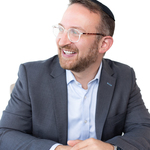The following appeared in the MHA / FYOS Reporter as the Message from the Dean on 5/8/2014
Though the drama played out in Washington D.C. and centered on a town in upstate New York, the issues debated, discussed, and pronounced in this week’s Supreme Court’s ruling on Town of Greece vs. Galoway struck a particular chord for our community here in Memphis, Tennessee.
The suit brought by two residents of Greece, NY, - one Jewish and one an atheist – described a situation all too familiar for Jews living in the Bible Belt. The claimants took issue with the fact that the Town Hall meetings of this Rochester suburb always opened with a prayer led by Christian clergy. They described feeling trapped between the discomfort of participating in a religious service other than their own and the discomfort of attracting the attention, and the possible ire, of the overwhelming majority of attendees should they choose to abstain.
I wonder if there is a Jew in Memphis who hasn't experienced the very same thing. In fact it isn't just the adults who repeatedly find themselves in these predicaments at business meetings, board meeting, civic meetings, and the like. It begins at the earliest of ages, once our kids are ready for competitive sports. Time and again, our students – boys with kippot on their head and tzitzis dangling from under their shirts, girls with knee-length skirts covering their shorts – will be invited to midcourt or to homeplate or to the starting line of the race to join their competition in prayer before the games begin. I've often wondered what Pope Urban II and Matityahu HaChashmonai would think if they saw the Grace Evangelical Crusaders invite the Hebrew Academy Maccabees to hold hands with them in prayer before the opening tip-off of a 6th grade basketball game.
The initial ruling in the Greece vs Galoway found the practice of the Town Hall to be a violation of the “Establishment Clause” of our Constitution’s First Amendment. That clause (which together with the subsequent “Free Exercise Clause” are the basis for what Thomas Jefferson later called the “separation of Church and State”) prohibits the United States from “establishing” any official government sanctioned religion. By engaging in consistent religious activity limited to one particular faith at an official government function, the town of Greece was found to be “establishing” Christianity as its official faith. This week, in a 5-4 decision, the Supreme Court of the United States reversed that decision and determined that the prayer service was, indeed, allowed under our Constitution.
The majority opinion based itself heavily on the weight of legal and historical precedent for prayer services within bodies of the government. The dissent, written by Jewish Justice Elana Kagan, centered largely on the argument that a Town Hall meeting is different from other legislative bodies as it is an open forum for the public and thus government-sanctioned prayer at such functions truly would constitute a violation of the Establishment Clause. As such, from a purely legal point of view, the case had no bearing on the situations we tend to face on a more regular basis. Prayer at a Service Master departmental meeting, at the quarterly meeting of the Tennessee Association of Independent Schools, or before the gun fires at a cross-country meet, is absolutely legal. As long as the governments isn't establishing a religion, and no one is being coerced into adhering to a religion, the free expression of religion, whether private or public, is a treasured piece of what it means to be an American. What’s more, in the Amicus Brief he wrote for in support of the Town of Greece (which cited sources ranging from Frank Leslie’s Illustrated News to the Ohr Sameach, the Iggros Moshe, and a letter from the Lubavitcher Rebbe), well-known civil rights attorney Nat Lewin noted that just because something causes someone else discomfort, doesn't mean it’s illegal.
Indeed, it doesn't. But it does mean that it causes them discomfort. In the case of public prayer, it’s almost always unintended. Quite the contrary –those who organize and implement such services generally see them as a universal good which benefits all in attendance. In fact, just a few months ago I was at a meeting where the organizers went far out of their way to order and obtain a kosher lunch just for me and only minutes after handing it to me asked me join them in an unmistakably Christological prayer. It didn't dawn on them for a second - despite the beard, the big black yarmulka, and the title of rabbi - that doing so would make me uneasy or uncomfortable.
So perhaps the battle here is being fought in the wrong arena. Perhaps it is less about legislation than it is about education. Perhaps it’s not about changing the corporate by-laws, but about better understanding our employees. Perhaps it’s not about altering the league rules, but about knowing more about the teams who comprise it. Maybe the coach from Grace Evangelical or Hope Presbyterian or Bellevue Baptist just needs to know that while the kids from the Hebrew Academy are totally supportive of their desire to pray before the game and while they wholly welcome their doing so, Jews just don’t pray that way. Maybe if we help them learn more about us, and we take the time to learn more about them, we can do more to protect and promote the cherished freedoms of this land than any court ever could.
CEO of the Ades Family Foundation. Founding Head of School of the Jewish Leadership Academy. Fascinated with the Jewish future.
